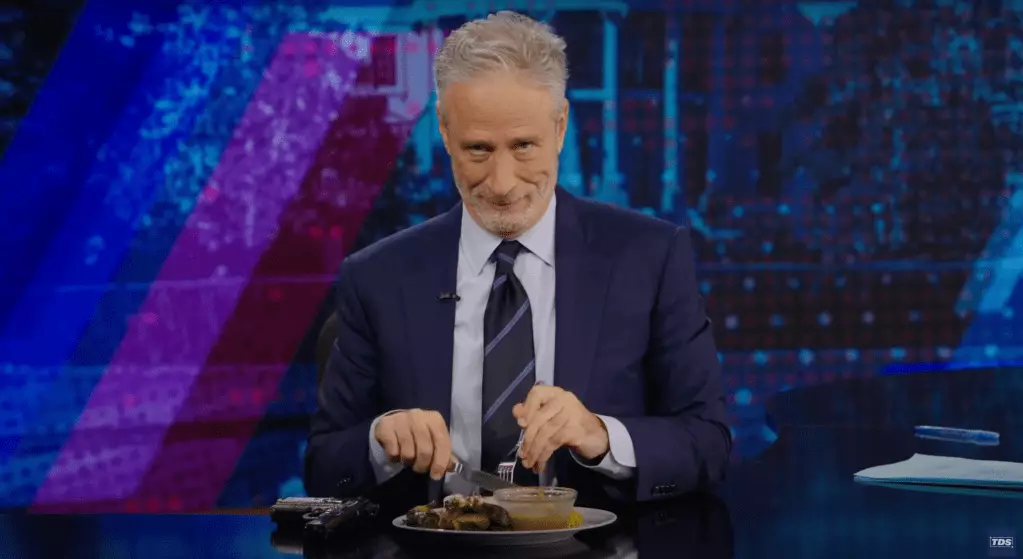Jon Stewart, the iconic political satirist, is back in the limelight, serving not just as the host of The Daily Show but also channeling his inner actor. In a recent segment, Stewart brought humor to a familial feast, portraying none other than Hunter Biden. With a comedic flair, he whispered to his on-screen father for a holiday pardon, playfully highlighting the absurdity of political nepotism. This unique moment served as both entertainment and an insightful commentary on the state of American politics, where personal connections can often overshadow justice.
Stewart’s ability to blend humor with serious issues is what sets him apart in the landscape of political comedy. His monologue began with a pointed critique of Donald Trump’s controversial appointment of Kash Patel as FBI director, an individual widely known for his loyalty to the former president and conspiracy-laden rhetoric. The audience’s jeers at the mention of Patel suggest a collective frustration with the increasingly surreal nature of political appointments in the U.S. As Stewart quipped about the public’s skepticism, he effectively encapsulated the prevailing sentiment that many Americans hold toward political decision-making today: a blend of disbelief and exasperation.
Stewart skillfully used satire to dissect Patel’s children’s book series, The Plot Against the King, which includes fantastical narratives featuring real political figures, including a farcical depiction of Hillary Clinton. His playful imitation of Dr. Seuss, complete with whimsical rhymes about Russia and Trump, resonated with audiences who utilize humor as a coping mechanism for the chaos that often defines modern politics. By engaging in this parody, Stewart underscored the ridiculousness of how serious topics like espionage and election interference have been trivialized in favor of whimsical storytelling.
Not only did he mock Patel, but Stewart also delved into a broader discussion of democracy and integrity. Addressing a clip of Joe Scarborough from MSNBC’s Morning Joe, who condemned the appointment as a breach of democratic principles, Stewart elaborated on the importance of “faith and the rule of law” in safeguarding justice. His retrospective comparison of political leaders to animated creatures from Madagascar offered a humorous yet poignant reminder that a lack of accountability can reduce societal structures to a circus-like state.
Stewart’s commentary reached a climax when discussing President Joe Biden’s recent pardon for his son, Hunter Biden. The criticism of political favoritism and the double standards often applied to politicians’ children was a significant part of Stewart’s act, as he bemoaned the missed opportunity for accountability. His incredulous reaction, “Motherf—er, we were so close,” encapsulated the frustration many feel in the face of what appears to be entrenched corruption and leniency for privileged individuals.
The content of the pardon itself, which encompasses a vast range of potential offenses, highlights a glaring disparity in how justice is meted out. Stewart cleverly pointed out the odd specificity of “the past 11 years,” humorously suggesting that perhaps New Year’s Eve festivities warranted inclusion due to some anticipated mischief. This joke not only adds levity to a serious topic but also serves as a critique of the vague and expansive legal protections afforded to those with political connections.
Stewart’s unique ability to blend humor with incisive political commentary makes his act both entertaining and enlightening. As the nation grapples with the implications of power, privilege, and the mechanisms of democracy, satirical voices like Stewart’s play a crucial role. His comedic handling of complex subjects reminds audiences of the absurdities they might overlook in the daily grind of political news. Through laughter, Stewart invites viewers to critically engage with the political landscape, emphasizing the necessity for accountability and integrity, all while maintaining a lighthearted approach that is both refreshing and necessary. In doing so, he reinforces the idea that humor can be a powerful tool for reflection in a world that often feels overwhelmingly serious.


Leave a Reply